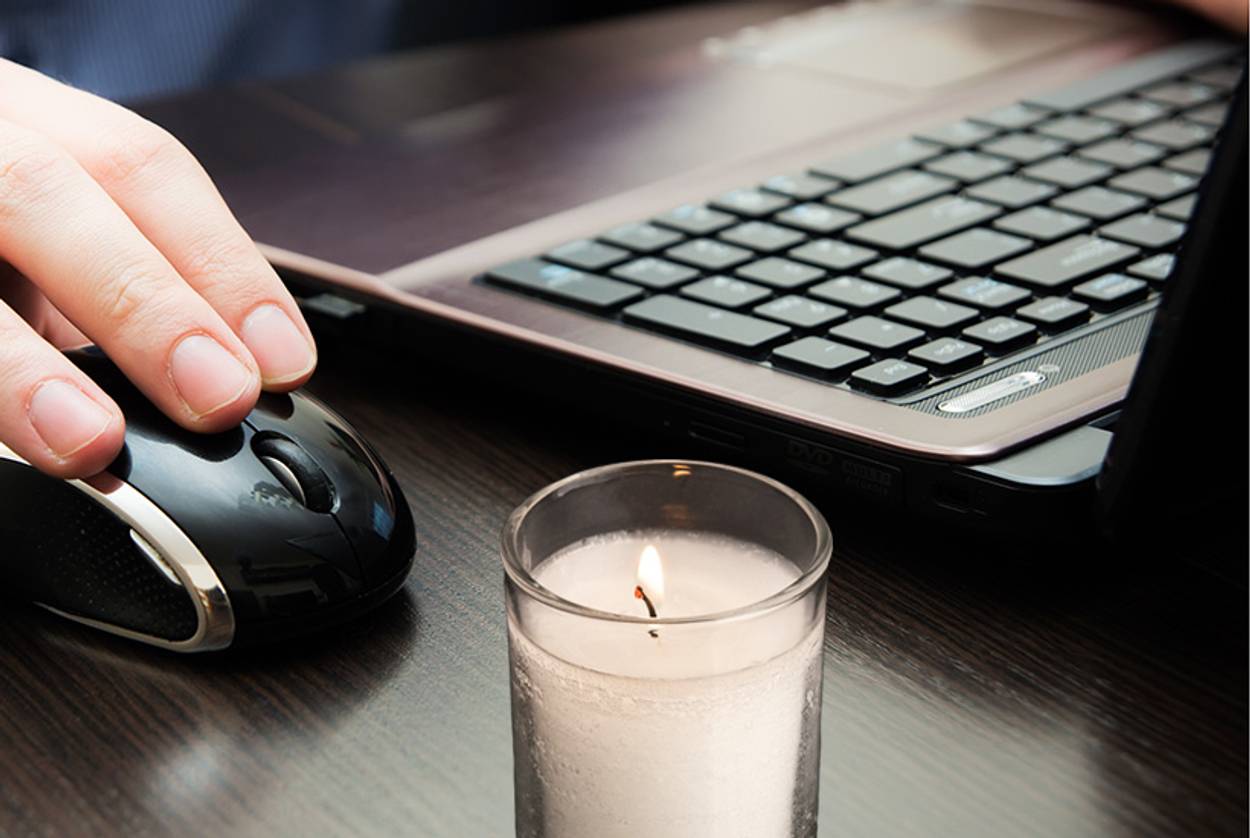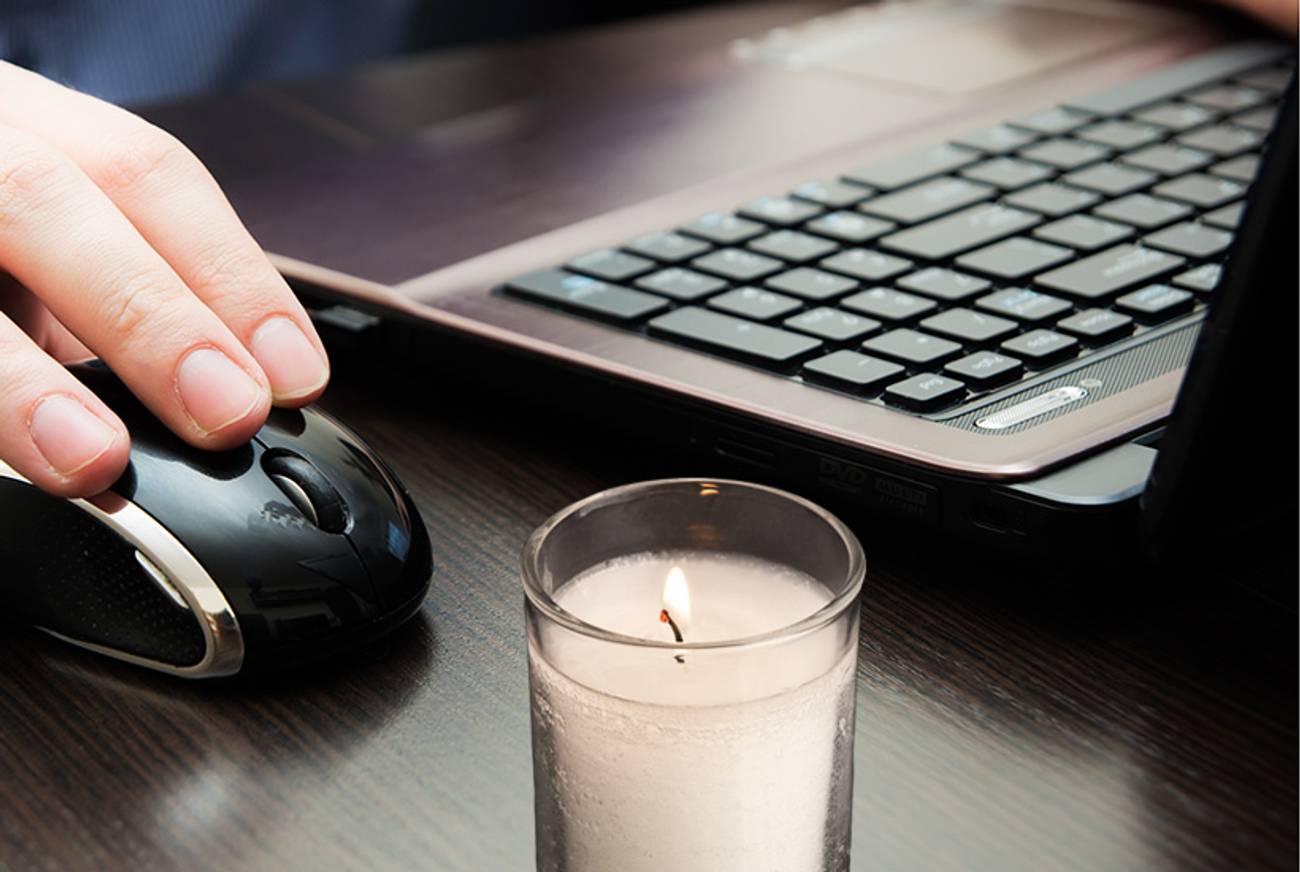A Younger Generation Finds a New Place To Talk About Mourning
Two Jewish women launched Modern Loss to help twenty- and thirtysomethings start a new conversation about struggling with grief




When I met Rebecca Soffer and Gabrielle Birkner last month in the lobby of an Upper West Side apartment complex, they were ensconced in talk of due dates and cramped apartments and the creative reuse of dog crates. Soffer, 37, and Birkner, 34, were both pregnant, with Soffer due to give birth any day—she gave birth to her son shortly before Christmas—and Birkner due to follow soon behind her.
Amid all the bubbly talk and the excitement of bringing new life into the world, one would be hard-pressed to recognize that these two women spend much of their time lately thinking about death. Soffer and Birkner both endured the loss of their parents at early ages. But they have channeled their grief into a new website called Modern Loss, intended as a forum for twenty- and thirtysomethings struggling with grief and mourning.
Soffer’s mother died in a car accident in 2006, and her father suffered a fatal heart attack three years ago. “My mom was my best friend on earth, and she was the nucleus of my life,” said Soffer. “She was the person I knew would always, always be there for me, no matter what, and to have her vanish from the face of the earth without any sort of warning or heads-up really pulled the rug out from underneath me.”
Birkner’s father and stepmother were murdered in a home invasion in Arizona in 2004. Birkner was working at the time as an obituary writer at a newspaper in Stamford, Ct. “I was in the newsroom when I found out,” she said. “That night, I went home and I wrote the obituary for my father, and I wrote one for my stepmother.”
For both women, the loss of a parent was both tragic and lonely. Well-meaning friends dropped away, unsure of how to provide comfort or sensitively approach the fraught subjects of death and mourning. Surviving family members were far away, and New York could be a difficult place for young women juggling career and relationships and mourning. “For so long I felt stigmatized. I felt like everyone knew. It was in the newspaper,” said Birkner. After her parents’ deaths, Soffer said, “I would go to parties and I would feel like the onus was on me to make everybody feel super-comfortable about what had gone on.” She briefly joined a support group for people who had lost their parents, only to find herself surrounded by people over 60.
Then a friend who knew both women, and who had also suffered a similar loss, introduced Soffer to Birkner. Soon they had formed the nucleus of a group of young women who had lost parents or loved ones and needed somewhere to talk through everything from inheritance issues to parents’ dating lives. With an impish sense of humor, they named the group WWDP—Women With Dead Parents.
WWDP was a source of comfort for both Birkner and Soffer during a period of sorrow and uncertainty. “The more I started talking about my loss in public, the better I felt, and the more sane I felt,” said Soffer, who eventually realized that she wanted to recreate the feeling of a trusted space for sharing about loss. “I can’t even tell you how many dating experiences all of us have gone through, marriages, children, job changes, we’ve leaned on each other for all of that,” said Soffer of WWDP. “That’s what made us realize, if this is what we’re getting out of it, then why don’t we create an online extension of that?”
The women launched Modern Loss in November. Containing personal essays, advice columns, how-to guides, and reader submissions, the site is an all-purpose gathering spot devoted to the subject of mourning and loss. Birkner and Soffer, who received some of their funding from the Shusterman Foundation, see Modern Loss as a nondenominational, nonjudgmental online community for those experiencing grief or those interested in learning more about it.
Birkner and Soffer are both Jewish, and their conversation is drizzled with references to shiva, kaddish, and the U’Netaneh Tokef prayer from the High Holiday services, but they see Modern Loss as a nondenominational site open to people of all religious backgrounds, heritages, and genders (although so far women substantially outnumber men among the contributors). Soon they plan to introduce an array of in-person events, ranging from small-scale, intimate gatherings like the ones they once hosted in their living rooms for WWDP to larger productions.
“This project is called Modern Loss for a reason,” said Soffer. “Older generations seemed to deal traditionally with discussing loss in different ways than we do. And that is a huge generalization, but I didn’t get from people my age ‘they’re in a better place now,’ or ‘now they’re an angel,’ or ‘it was meant to be’ as much as I did from older people, because they’re used to saying that. They’re used to brushing it under the rug, they’re used to not being open about the excruciating aspects of loss.” Birkner and Soffer envisioned a site that would match their group’s conversations: loose, occasionally sarcastic, wide-ranging, and nonjudgmental. Without encouraging readers to wallow in their grief, it would seek to remind them that there is no expiration date to sadness. “The narrative of the long arc of loss is forever. It doesn’t have to own you, but you’re going to experience it in many different ways. It’s OK, because we still experience it,” said Soffer.
Modern Loss is not intended to replace the intimate conversations with friends or clergy members. The site “can coexist very happily with other communities,” said Soffer. “It just can enhance it.” And while there are many worthy books about death and grieving, ranging from Meghan O’Rourke’s The Long Goodbye to Harold Kushner’s When Bad Things Happen to Good People, “not everybody has time to read 50 books on grief,” said Soffer. “Everybody has time to read a 700-word essay here and there.”
Thomas Lynch, co-author of The Good Funeral: Death, Grief, and the Community of Care, said Modern Loss “seems like a pretty straightforward effort to create community in a place where community has been damaged by postmodernity.” Lynch, 65, sees the site as reflective of a profound generational shift in the approach to death: “The people of my children’s generation do not have the infrastructure of family and faith communities, the infrastructure of ritual and language and duties that are assigned to everybody, the dead and the living. That has fallen apart.” Moreover, he said, Modern Loss demonstrates a shift in the discussion of death, from the journey of the dead to the journey of the living: “Websites like this seem to articulate [that] the central journey, the central work that has to be done, is how are the survivors going to get through this?”
Both Soffer and Birkner have professional experience relevant to their new website. Soffer, a graduate of Columbia’s journalism school, had been a producer for The Colbert Report. ((She also served as a guest host for Vox Tablet while Sara Ivry was on maternity leave.) And Birkner had worked as a journalist for The Forward and now freelances regularly for the Wall Street Journal. Soffer had been pondering for some time the idea of a site devoted to loss, but her own struggles with grief had stood in the way of what she hoped to accomplish. “I personally wasn’t ready to do this three years ago because I lost my dad three years ago,” said Soffer. “For me, it’s about changing a conversation. Working at Colbert, you’re changing a conversation about politics. For Modern Loss, it’s loss. What has the conversation been, and how can we open it up, and change it, and advance it?” Modern Loss’ goal is to be accessible, modern, and chatty, “because that’s the way we are,” said Soffer.
Since the site launched, Birkner and Soffer have been happily deluged with hundreds of emails and pitches for stories. They heard from surprising voices, like Robyn Woodman, who wrote an essay about her deceased husband, whom she discovered after his death had been cheating on her with multiple women: “For the longest time, I was furious with Max. I wanted to scream and kick and make him answer for his actions. I even imagined him coming back to life, just so I could punch him in the face.”
Esther Kustanowitz’s “Deleting My Mother” describes the ways Gmail’s pesky auto-add feature prompted her to remove her deceased mother’s email address from her contacts: “Even during fleeting moments of webtech fantasy, I was aware enough to know I couldn’t keep torturing myself this way.” Birkner and Soffer also received a letter from an evangelical Christian woman who had lost a close friend and was cajoled by her community to look on the bright side of a 30-year-old woman leaving behind a husband and child. “She felt this extreme pressure to be positive when she didn’t feel positive,” said Birkner. “She didn’t want to hear the traditional religious rhetoric.”
Modern Loss’ attitude of openness helps to attract new writers. “I really liked that both of the founders had their own story of loss, because I knew they would treat myself and everyone else with respect,” said Woodman, who first learned of the site after responding to a query from Tre Miller Rodriguez, a writer and Modern Loss contributor. “The response that I got from everyone [for my article] is exactly why Modern Loss exists. It’s a place for people to come together.”
***
You can help support Tablet’s unique brand of Jewish journalism. Click here to donate today.
Saul Austerlitz is the author of Sitcom: A History in 24 Episodes from I Love Lucy to Community. His Twitter feed is @saulausterlitz.
Saul Austerlitz is the author ofSitcom: A History in 24 Episodes from I Love Lucy to Community. His Twitter feed is @saulausterlitz.